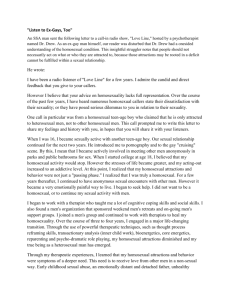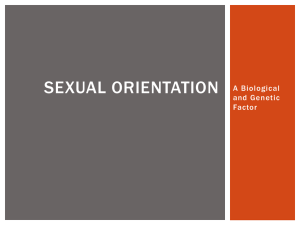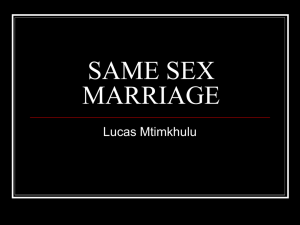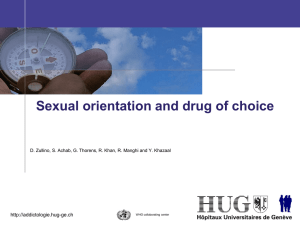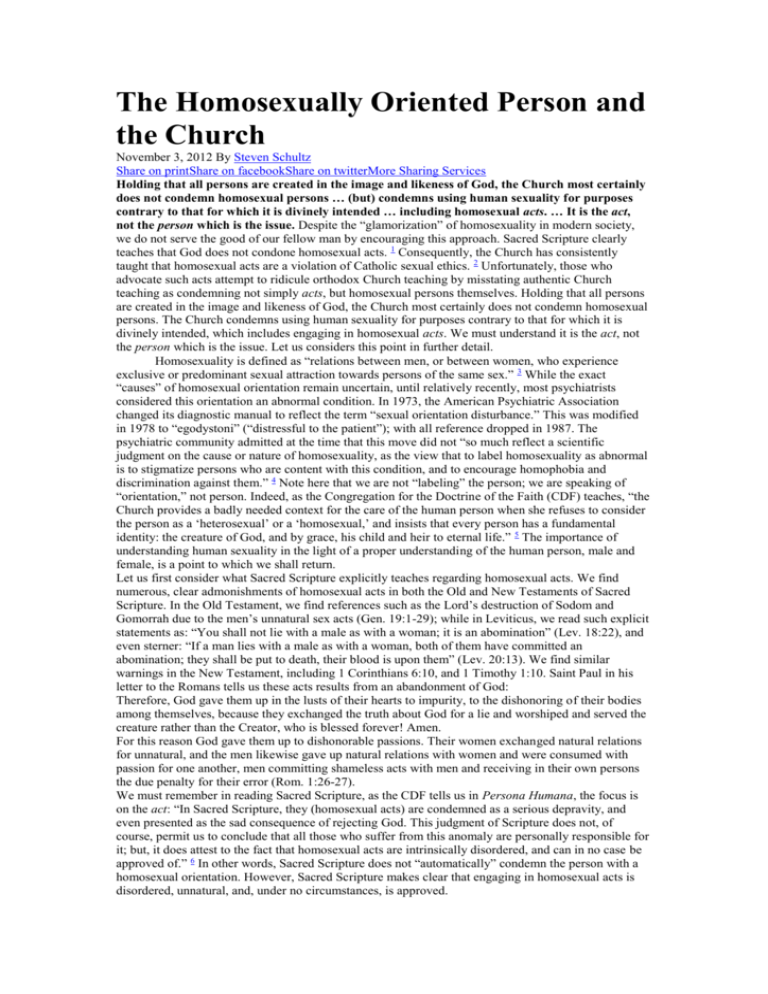
The Homosexually Oriented Person and
the Church
November 3, 2012 By Steven Schultz
Share on printShare on facebookShare on twitterMore Sharing Services
Holding that all persons are created in the image and likeness of God, the Church most certainly
does not condemn homosexual persons … (but) condemns using human sexuality for purposes
contrary to that for which it is divinely intended … including homosexual acts. … It is the act,
not the person which is the issue. Despite the “glamorization” of homosexuality in modern society,
we do not serve the good of our fellow man by encouraging this approach. Sacred Scripture clearly
teaches that God does not condone homosexual acts. 1 Consequently, the Church has consistently
taught that homosexual acts are a violation of Catholic sexual ethics. 2 Unfortunately, those who
advocate such acts attempt to ridicule orthodox Church teaching by misstating authentic Church
teaching as condemning not simply acts, but homosexual persons themselves. Holding that all persons
are created in the image and likeness of God, the Church most certainly does not condemn homosexual
persons. The Church condemns using human sexuality for purposes contrary to that for which it is
divinely intended, which includes engaging in homosexual acts. We must understand it is the act, not
the person which is the issue. Let us considers this point in further detail.
Homosexuality is defined as “relations between men, or between women, who experience
exclusive or predominant sexual attraction towards persons of the same sex.” 3 While the exact
“causes” of homosexual orientation remain uncertain, until relatively recently, most psychiatrists
considered this orientation an abnormal condition. In 1973, the American Psychiatric Association
changed its diagnostic manual to reflect the term “sexual orientation disturbance.” This was modified
in 1978 to “egodystoni” (“distressful to the patient”); with all reference dropped in 1987. The
psychiatric community admitted at the time that this move did not “so much reflect a scientific
judgment on the cause or nature of homosexuality, as the view that to label homosexuality as abnormal
is to stigmatize persons who are content with this condition, and to encourage homophobia and
discrimination against them.” 4 Note here that we are not “labeling” the person; we are speaking of
“orientation,” not person. Indeed, as the Congregation for the Doctrine of the Faith (CDF) teaches, “the
Church provides a badly needed context for the care of the human person when she refuses to consider
the person as a ‘heterosexual’ or a ‘homosexual,’ and insists that every person has a fundamental
identity: the creature of God, and by grace, his child and heir to eternal life.” 5 The importance of
understanding human sexuality in the light of a proper understanding of the human person, male and
female, is a point to which we shall return.
Let us first consider what Sacred Scripture explicitly teaches regarding homosexual acts. We find
numerous, clear admonishments of homosexual acts in both the Old and New Testaments of Sacred
Scripture. In the Old Testament, we find references such as the Lord’s destruction of Sodom and
Gomorrah due to the men’s unnatural sex acts (Gen. 19:1-29); while in Leviticus, we read such explicit
statements as: “You shall not lie with a male as with a woman; it is an abomination” (Lev. 18:22), and
even sterner: “If a man lies with a male as with a woman, both of them have committed an
abomination; they shall be put to death, their blood is upon them” (Lev. 20:13). We find similar
warnings in the New Testament, including 1 Corinthians 6:10, and 1 Timothy 1:10. Saint Paul in his
letter to the Romans tells us these acts results from an abandonment of God:
Therefore, God gave them up in the lusts of their hearts to impurity, to the dishonoring of their bodies
among themselves, because they exchanged the truth about God for a lie and worshiped and served the
creature rather than the Creator, who is blessed forever! Amen.
For this reason God gave them up to dishonorable passions. Their women exchanged natural relations
for unnatural, and the men likewise gave up natural relations with women and were consumed with
passion for one another, men committing shameless acts with men and receiving in their own persons
the due penalty for their error (Rom. 1:26-27).
We must remember in reading Sacred Scripture, as the CDF tells us in Persona Humana, the focus is
on the act: “In Sacred Scripture, they (homosexual acts) are condemned as a serious depravity, and
even presented as the sad consequence of rejecting God. This judgment of Scripture does not, of
course, permit us to conclude that all those who suffer from this anomaly are personally responsible for
it; but, it does attest to the fact that homosexual acts are intrinsically disordered, and can in no case be
approved of.” 6 In other words, Sacred Scripture does not “automatically” condemn the person with a
homosexual orientation. However, Sacred Scripture makes clear that engaging in homosexual acts is
disordered, unnatural, and, under no circumstances, is approved.
Despite the clear teaching of Persona Humana, following its publication, in some circles “an overly
benign interpretation was given to the homosexual condition itself, some going so far as to call it
neutral, or even good.” 7 To counter this growing trend, the CDF issued its Letter to the Bishops of the
Catholic Church on the Pastoral Care of Homosexual Persons in October 1986. In this letter, the CDF
stated the issue clearly: “Although the particular inclination of the homosexual person is not a sin, it is
more or less a strong tendency ordered toward an intrinsic moral evil; and thus the inclination itself
must be seen as an objective disorder.” 8 The CDF also addressed the issue of “new” exegesis of
Sacred Scripture, which claimed it can only be interpreted as applying to a particular culture in a
particular time. The CDF countered this statement:
What should be noticed is that, in the presence of such remarkable diversity, there is nevertheless a
clear consistency within the Scriptures themselves on the moral issue of homosexual behavior. The
Church’s doctrine regarding this issue is thus based, not on isolated phrases for facile theological
argument, but on the solid foundation of a constant Biblical testimony. The community of faith today,
in unbroken continuity with the Jewish and Christian communities within which the ancient Scriptures
were written, continues to be nourished by those same Scriptures and by the Spirit of Truth whose
Word they are. It is likewise essential to recognize that the Scriptures are not properly understood when
they are interpreted in a way which contradicts the Church’s living Tradition. To be correct, the
interpretation of Scripture must be in substantial accord with that Tradition. 9
Why is there such a strong prohibition against homosexual acts? Very simply, such acts go against the
nature of proper human sexuality. In order to understand the problem with homosexual acts, we must
first understand the proper role of human sexuality. Our foundational rule, derived from the
personalistic norm, 10 is that one may never use another person as merely means for an end. Using a
person in this way violates the very essence of the other, founded in his God-given free will, and selfdetermination. 11 Failing to abide by the personalistic norm, leads almost directly to a sense of
utilitarianism, placing a personal relativistic “good” as the basis of morality. The utilitarian seeks
subjectively defined pleasure, avoiding subjectively defined pain. As its basis, this philosophy treats
other persons as mere “things” for one’s use in obtaining pleasure and avoiding pain. 12
Man possesses a natural “sexual urge.” This sexual urge is not an uncontrollable, animal instinct, but
instead is at the control of one’s intellect. Through free will, the person is able to use his sexual urge as
he sees fit. However, free will does not make every choice correct or ethical. In his free will, man is
able to freely choose the path of good, or the path of evil; in his actions he reveals himself. With
regards to the sexual urge, its proper use, as seen in natural law, is the continued existence of the
species. This proper nature of human sexuality can only be expressed in the union of a male and a
female; for it is only this type of union which opens the path to procreation. A homosexual “union” is
inherently incapable of procreation and, therefore, stands in stark opposition to the proper nature of the
sexual urge. 13
Further, due to its nature, human sexuality is properly expressed only in the union of man and woman
as husband and wife. Both the Bible, and consistent Church teaching, declare that sexual intercourse is
a moral good only within the context of marriage. Therefore, sexual intercourse between unmarried
persons is not permissible. As Father Kenneth Baker writes, “sexual intercourse represents and
expresses a permanent, mutual gift of self which is realized only in marriage…sexual intercourse
between a man and a woman gives exterior expression to the interior love that exists between them.” 14
From this, we can see that the nature of marriage has two aims: the education of children to maturity,
and the growth of love and friendship between man and wife. These aims simply cannot be obtained in
homosexual acts. 15 Indeed, as the CDF says:
To choose someone of the same sex for one’s sexual activity is to annul the rich symbolism and
meaning, not to mention the goals, of the Creator’s sexual design. Homosexual activity is not a
complementary union, able to transmit life; and so it thwarts the call to a life of that form of self-giving
which the Gospel says is the essence of Christian living. This does not mean that homosexual persons
are not often generous and giving of themselves; but when they engage in homosexual activity they
confirm within themselves a disordered sexual inclination which is essentially self-indulgent. 16
We mentioned utilitarianism earlier; let us return again to this point. There is little escaping the fact
that homosexual acts—since they are fundamentally incapable of fulfilling the proper norms of human
sexuality—are inherently utilitarian. Homosexual acts “seek the pleasure of the orgasm, isolated from
any genuinely and authentically satisfying human good. 17 The homosexual act becomes about using
another person as mere means to the end of one’s own sexual gratification. Such an action, even in
heterosexual acts, is utilitarian, and a gross violation of the personalistic norm.
None of this means there is no hope of a life in the Lord for the person of homosexual orientation.
Quite the contrary; there is no reason such a person cannot live a meaningful, rich, and holy life. Every
Christian, including those of homosexual orientation, is called to a life of chastity. The situation of the
homosexually oriented person is no different from the Christian whose spouse is chronically ill, or
separated by distance for long periods of time, nor even the unmarried person—the fact they are
“deprived” of sexual relations does not translate into license to engage in illicit sexual activity. Instead,
their situation can become a source of a life, rich in holiness, as they bear their “cross.” 18
Properly understood, Catholic teaching on homosexuality is one of great charity towards the person.
The Church lovingly welcomes all persons, and staunchly defends the inherent human dignity of all
persons, as created in the image and likeness of God. Lawler, Boyle and May provide us an excellent
summation when they write:
Persons of a homosexual orientation deserve the love and support of the Christian community. They
are called to friendship with God and to holiness of life, as are all human persons; and they have
distinctive heavy burdens to bear. If, as many homosexuals do, they carry their burdens with generous
and chaste fidelity, they support and strengthen all Christians. They become witnesses to the nobility of
making great personal sacrifices to guard the great human goods sexuality is ordered to. Should they
fall in their human weakness, they should still receive the compassionate concern that all persons long
for. 19
1.
2.
3.
4.
5.
6.
7.
8.
9.
10.
11.
12.
13.
14.
15.
16.
17.
18.
19.
Cf. Gen 19:1-29; Lev 18:22; Lev 20:13; Rom 1:24-28; 1 Cor 6:10; 1 Tim 8-11. ↩
Cf. CCC 2357-2359. ↩
CCC, 2357. ↩
Benedict M. Ashley, OP and Kevin D. O’Rourke, OP, Health Care Ethics: A Theological
Analysis, Fourth Edition (Washington, DC: Georgetown University Press, 1997), 390. ↩
Congregation for the Doctrine of the Faith, Letter to the Bishops of the Catholic Church on
the Pastoral Care of the Homosexual Person, 1 October 1986
(http://www.vatican.va/roman_curia/congregations/cfaith/documents/rc_con_cfaith_doc_1986
1001_homosexual-persons_en.html, accessed 18 February 2011), 16. ↩
Congregation for the Doctrine of the Faith, Persona Humana, 29 December 1975
(http://www.vatican.va/roman_curia/congregations/cfaith/documents/rc_con_cfaith_doc_1975
1229_persona-humana_en.html, accessed 18 February 2011), VIII. ↩
Letter to Bishops, 3. ↩
Ibid., 3. ↩
Ibid., 5. ↩
The Personalistic Norm says the person is a good towards which the only proper and adequate
attitude is love (Karol Wojtyla, Love and Responsibility, 41). ↩
Karol Wojtyla, Love and Responsibility (San Francisco: Ignatius Press, 1993), 26, 27. ↩
Ibid., 35-37. ↩
Ibid., 50, 52-53. ↩
Kenneth Baker, SJ, Fundamentals of Catholicism: Volume 1, Creed and Commandments (San
Francisco: Ignatius Press, 1985), 220. ↩
Ibid., 220-221. ↩
Letter to Bishops, 7. ↩
Rev. Ronald Lawler, OFM Cap., Joseph Boyle, Jr., and William E. May, Catholic Sexual
Ethics: A Summary, Explanation, & Defense, Second Edition (Huntington, IN: Our Sunday
Visitor, 1998), 190. ↩
Ibid., 192. ↩
Lawler, Boyle and May, 192. ↩


